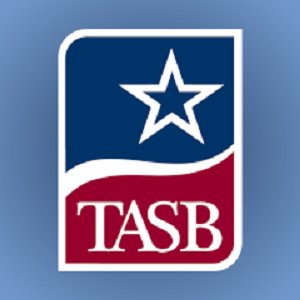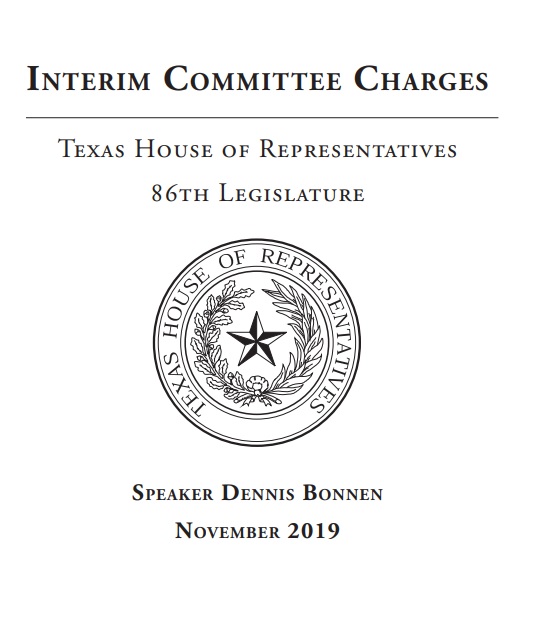
From Dax Gonzalez, TASB Governmental Relations Division
Texas House Speaker Dennis Bonnen this week released his list of interim charges, as well as a notice that he will be naming some select committees in the coming weeks to evaluate additional issues. House committees will consider these interim charges and publish reports upon completion of their hearings. House members will likely file legislation to address these issues next session. Some charges of particular interest to school boards include:
House Public Education Committee
- Monitor the agencies and programs under the Committee’s jurisdiction and oversee the implementation of relevant legislation passed by the 86th Legislature. Conduct active oversight of all associated rulemaking and other governmental actions taken to ensure intended legislative outcome of all legislation, including the following:
- HB 3, which relates to public school finance and public education. Monitor the Texas Education Agency’s (TEA) implementation of the bill, including the extensive rulemaking process and broad unintended consequence authority of the commissioner. Examine the pay raises districts have provided to staff and the various approaches adopted to differentiate these salary increases according to experience.
- HB 1842 (84R), HB 22 (85R), SB 1882 (85R), and HB 3906, which relate to public school accountability, assessment, interventions, and district-charter partnerships. Monitor the ongoing progress of the TEA’s implementation and rulemaking of the A-F rating system, the State of Texas Assessments of Academic Readiness (STAAR), and public school sanctions and interventions.
- SB 1873 (85R), which relates to reporting certain school district health and safety information. Review the report on physical education prepared by the TEA and determine what, if any, next steps are needed based on the data collections. Related to Behavioral Health (Joint charge with Committee on Public Health)
- HB 18, which enhances school safety and mental health resources for students and school personnel and works to reduce the stigma around mental health conditions. Monitor the process by which state agencies coordinate to implement the legislation and their compliance with various requirements, including providing required guidelines and resources to schools.
- HB 19, which places non-physician mental health professionals at education service centers to provide resources for educators and administrators in school districts and charter schools.
- HB 906, which creates the Collaborative Task Force on Public School Mental Health Services.
- SB 11, which creates the Texas Child Mental Health Care Consortium to facilitate access to mental health care services through telehealth and expands the mental health workforce through training and funding opportunities. Monitor the creation of the consortium and agencies’ rulemaking processes. Review how school districts are spending their school safety allotment.

2. Determine if any barriers exist in providing a digital learning environment for all children, including an evaluation of the competitive marketplace for blended learning products and
services. Evaluate the effectiveness of the Technology and Instructional Materials Allotment (TIMA) in providing districts the resources necessary to equip students with instructional
materials and technology, including in the review all programs and initiatives funded by setasides from the TIMA. Monitor the performance and accountability of the state’s full-time
virtual schools and online courses provided through the Texas Virtual School Network.
3. Monitor the progress of the TEA’s compliance with the Corrective Action Response required by the United States Department of Education, the implementation of the state’s Special Education Strategic Plan, and the state’s compliance with other federal requirements regarding special education, including maintenance of state financial support for special education. Recommend solutions to barriers the agency, school districts, students with disabilities, and parents face in accessing a free and appropriate public education and in meeting the milestones of the plan and any measures needed at the state level to ensure that students with disabilities are being located, fully evaluated, and appropriately identified for special education instruction and services.
4. Monitor the State Auditor’s review of agencies and programs under the Committee’s jurisdiction. The Chair shall seek input and periodic briefings on completed audits for the 2019 and 2020 fiscal years and bring forth pertinent issues for full committee consideration.
House State Affairs Committee
Study how governmental entities use public funds for political lobbying purposes. Examine what types of governmental entities use public funds for lobbying purposes. Make recommendations to protect taxpayers from paying for lobbyists who may not represent the taxpayers’ interests
House Ways and Means Committee
Study and consider possible methods of providing property tax relief, including potential sources of revenue that may be used to reduce or eliminate school district maintenance and operations property tax rates.
House Appropriations Committee
Review and evaluate the actuarial soundness of the Employees Retirement System and Teacher Retirement System pension funds. Examine the cost of and potential strategies for achieving and maintaining the actuarial soundness of the funds. Examine the effect the unfunded liabilities could have on the state’s credit rating. Examine the state’s investment policies and practices, including investment objectives, targets, disclosure policies, and
transparency. (Joint charge with the House Committee on Pensions, Investments & Financial Services)
House Appropriations Subcommittee on Article III (Education)
- Monitor the agencies and programs under Article III and oversee the implementation of relevant legislation and riders passed by the 86th Legislature.
- Evaluate ongoing costs associated with implementing the provisions of HB 3.
- Review formula funding for higher education institutions in Texas. Examine the general efficiency and equity of formula funding for these higher education institutions. Monitor the implementation of mission-specific pilot formulas at the state’s health-related institutions.
- Examine the state higher education institutions’ resources and research into the causes and cures for degenerative and debilitating brain and nervous conditions and the projected costs
to the state for the treatment of those conditions.





